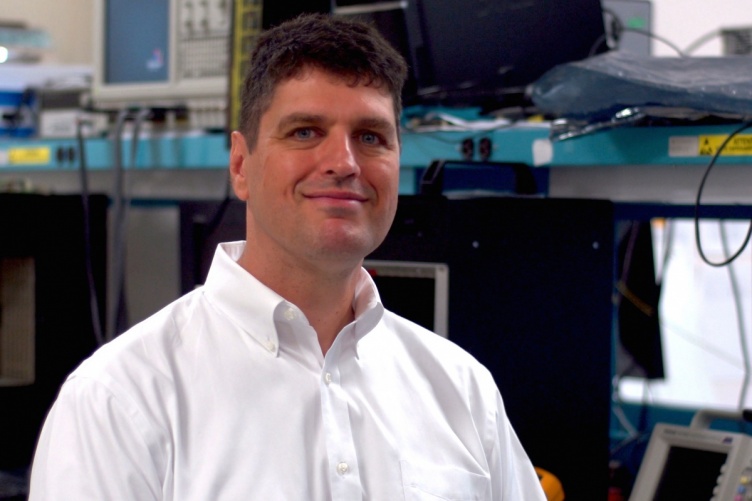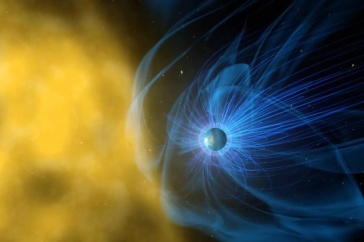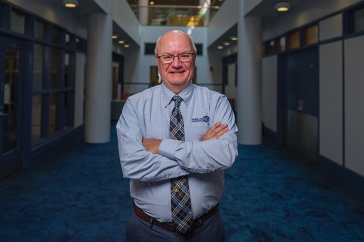
UNH faculty member Nathan Schwadron has been elected to the 2022 Class of Fellows of the American Geophysical Union (AGU) — a prestigious international award that honors exceptional scientific contributions to Earth and space sciences.
Schwadron, a physicist who studies the sun, space weather, interstellar boundaries, cosmic rays and radiation, is among the 54 international scientists who are recognized by AGU for work that has significantly advanced research in their fields. Each year, fewer than 0.1% of AGU members are bestowed this lifelong fellowship. Schwadron joins seven other UNH faculty members who have received this award since 2016.
“We are thrilled that Nathan has been selected as an AGU Fellow in recognition of his remarkable contributions to the field of space science,” says Marian McCord, senior vice provost for research, economic engagement and outreach at UNH. “In addition to his exemplary research and scholarship, Nathan is a dedicated teacher and mentor, and a wonderful community member who gives back in numerous ways. We are fortunate to have Nathan here at UNH.”
"The work we do as a team enables us to take leaps forward in science that no one person alone could accomplish."
Schwadron has been a faculty member in the UNH physics department and the Space Science Center since 2010. Harlan Spence, director for the UNH Institute for the Study of Earth, Oceans, and Space, praises Schwadron for his years of dedication to his field. “Having worked with Nathan on a number of projects, I can attest to his research excellence and his incredible productivity,” Spence says. “This AGU honor affirms what I’ve witnessed for a long while: his relentless pursuit of discovery in space plasma physics is matched only by his unbounded energy and intellectual might.”
In addition to his recent election as an AGU Fellow, Schwadron was previously awarded a UNH Presidential Chair from 2018 to present and was named the Norman S. and Anna Marie Waite Professor for the Physics Department from 2017 to present. Alongside his passion for teaching and mentoring undergraduates and graduate students, Schwadron has a long research record in the area of heliophysics — the study of the sun and the solar wind’s interactions to form intertallar boundaries around our solar system and space weather. He has led myriad research programs spanning topics including solar wind, global heliosphere, particle acceleration and propagation, and studies of the interaction of radiation with materials and biological matter.
Schwadron currently leads two science operations centers for NASA missions: The Interstellar Boundary Explorer Mission Science Operations Center, which has been in existence since 2007, and the Parker Solar Probe Plus Integrated Science Investigation of the Sun Science Center, which began in 2011. He’s serving numerous roles on NASA’s Interstellar Mapping and Accretion Probe (IMAP) Mission, including the deputy principal investigator, the UNH institutional lead, and the lead for the IMAP-Lo instrument.
His work also focuses on the impact of radiation on astronauts and technology in space. Schwadron helped to develop innovative methods for dosimetry — the measurement of the amount of radiation absorbed by a substance or living organism — and a detector that laid the foundation for a new generation of lightweight detectors sensitive to the full spectrum of particle radiation. Related to this, he leads the Earth-Moon-Mars Radiation Environment Module, a computer modeling project that will help scientists to improve their predictions of radiation exposure to more adequately plan for future space missions to the moon and Mars that may involve humans. In addition, Schwadron was a co-lead on the Sun-to-Ice Project, funded by the National Science Foundation, that studied particle acceleration and radiation interactions from extreme solar events and their effects on the Earth.
Amidst his lengthy list of career achievements, Schwadron is quick to point out the support he’s received along the way.
“My research work is done with remarkable teams of scientists and engineers here at UNH and at partner institutions in the U.S. and throughout the world,” Schwadron notes. “The work we do as a team enables us to take leaps forward in science that no one person alone could accomplish. I would like to thank my close colleagues Dave McComas, Harlan Spence and Sonya Smith and my spouse Katharine Duderstadt, who have helped to provide immeasurable support through multiple decades.”
The UNH Institute for the Study of Earth, Oceans, and Space (EOS) is UNH's largest research enterprise, comprising six centers with a focus on interdisciplinary, high-impact research on Earth and climate systems, space science, the marine environment, seafloor mapping and environmental acoustics. With approximately 100 principal investigators managing more than 400 individual grant awards, and with annual expenditures exceeding $45 million, EOS fosters an intellectual and scientific environment that advances visionary scholarship and leadership in world-class and graduate education.
-
Written By:
Rebecca Irelan | Institute for the Study of Earth, Oceans, and Space | rebecca.irelan@unh.edu | 603-862-0990
















































